About three years ago now, when I was interviewing with the Pastor Search Committee of Washington Plaza, I was asked: "What is one  of the biggest mistakes you've made in your life?" (which is an interesting question by the way).
of the biggest mistakes you've made in your life?" (which is an interesting question by the way).
I'm sure I paused for a minute or two to answer (because who really wants to speak about failures at a job interview), but still remember what I said. And it was, "Times in my life when I have not been truthful to myself. When I have responded to situations in ways that were what others expected of me, or made decisions based on what was more of an acceptable choice, or held back part of myself in hopes that it might make others like me more. "
And, if someone were to ask me this same question today, I believe I'd respond in a similar way-- for when I think great errors in judgment have been made on my part, it usually goes back to a fear or inability to be ok with authenticity at a deep level. I've allowed myself to be beat down by things that people have said to me that are out of line with what I know God thinks of me. Or, I've allowed the puffed praise of others to led me to think more of myself and act in a way that shows I think I'm better than . . .
This week, I was having a conversation with a friend who I've been in relationship with for over 15 years. We've appeared in and out of each other's life stories though we've rarely resided in the same city. We were talking about what makes up the "good stuff" of conversations (at least from my perspective) . . . what makes us tick as people, what makes us deeply sad, and what we fears surround our lives that we rarely say aloud. And a consistent theme emerged: our deepest regret in our lives, even as my friend and I are generations a part in age, all goes back to authenticity.
We've both held parts of ourselves back in our friendships, our vocations and our marriages at different points when the fear that we just weren't good enough, or didn't have the right things to say (or in our case sometimes had too much to say), or even that if people found out what we really thought we wouldn't be accepted as readily.
And, the more I reflected on this conversation since, the more it has enlivened me and saddened me at the same time. Enlivened my spirit because through the sweet words of this kindred spirit friend, I've got some pep in my step again to keep moving in the direction of what I feel God has given me passion to do: to deeply encourage the hearts of discouraged that life in God's hands can be better than we ever imagined it to be. But, I was also saddened because I know both how few resources of encouragement there are to live life this way (as everything in our culture seeks to tell us we are not right and must be "fixed" by changing our mold from how our Creator designed us to be), and how constantly fear seeks to hold all of us back from living out of this most authentic place.
It's really, really hard, I know to live life from your core of believing so strongly in something about your vocation, your relationships or just your life in general or even if this truth you know will cause hurt feelings to others you care about, led to criticism or failure, and more sleepless nights of despair than you can count. But, I know for certain that as I see it in scripture, salvation is all about being made whole. So, if we say we are a people who are in the process of "being saved" then, we've got to get to the business of living life truthfully.
And by truth, I mean this: more than avoiding white lies to our bosses, more than admitting to our kids that we aren't supermen and women all of the time, and more than just trying to follow the 10 commandments, but taking the leap of abiding more honestly in this world as ourselves. Living with passion of who we were made to be and not thinking any greater or less of ourselves than God created us when the Lord said we were "made in the image of God."
Let's all stop making the mistake of forgetting and not acting on this great truth. In authentic living, I know there are sweet life moments just around the corner for all of us no matter in what circumstances we find ourselves in now.
God can be found in the strangest places. God can be found when we least expect, even in places where we don't feel welcomed.
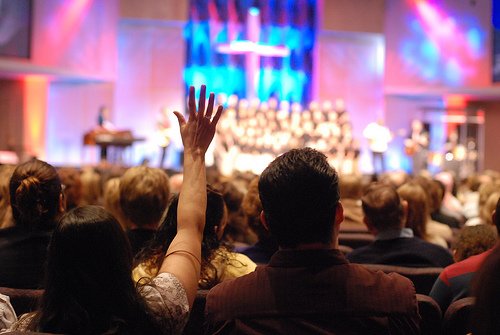 Last week, I had the opportunity with a friend to attend an event an evangelical Bible church, a place I would normally not go for a concert my friend really wanted to attend. I don't like settings like this because I feel that if I were to open my mouth and tell the person beside me what I do, who knows what might be said or done to me! While there have been great strides in the acceptance of women clergy in certain settings, there probably still more Christians in the world who believe the manner in which I am carrying out my vocational calling is misguided and wrong. I simply hate to pretend. I don't like to feel like I'm not allowed to speak, and so evangelical Bible land is not on any list of a place I'd like to go back to anytime soon.
Last week, I had the opportunity with a friend to attend an event an evangelical Bible church, a place I would normally not go for a concert my friend really wanted to attend. I don't like settings like this because I feel that if I were to open my mouth and tell the person beside me what I do, who knows what might be said or done to me! While there have been great strides in the acceptance of women clergy in certain settings, there probably still more Christians in the world who believe the manner in which I am carrying out my vocational calling is misguided and wrong. I simply hate to pretend. I don't like to feel like I'm not allowed to speak, and so evangelical Bible land is not on any list of a place I'd like to go back to anytime soon.
However, as I was sitting in the concert, observing a blast from my past (I used to be great fan of the music that was being played), I began writing this blog in my head. For as much as I heard impassioned songs and speeches about who these individuals knew God and God's church to be, it is not the ONLY way. I felt empowered to claim differing ideas of what the church is and should be and why voices of progressive Christians like myself need to be heard as much as any evangelical ones do.
Though my church is not mega sized with bathrooms that look designed for stadium crowds with pamphlets on every corner about a particular ministry with rules for how everything in the church should be ordered, I believe we are faithful in what we do. And this is what church means to me:
1. A place where all are welcomed-- where no creed, code or dress gets you in the door faster than any others. To be a woman, a minority, a gay, lesbian, bi-sexual or transgendered person doesn't mean that you come into church as a second class citizen. All are one in Christ Jesus who is Lord-- and no sin is greater than any other (and being gay is not a sin).
2. God is bigger, as the saying goes, than any one religion. While Jesus is our path, we have much to learn from the faith expressions of other seekers. Being respectful of the beliefs of others is a non-negotiable.
3. Life can never be summed up in proof texting scriptures like "Rejoice in the Lord always" "In all things God works together for the good" or "Pray without ceasing" (i.e. if you just pray enough then God will give you what you ask for). Life as I know in this church of mine is too messy for simple band-aid answers. There is only so much one can take. And, to make blanket statements like "God is testing you" or "You must clear out all of the sin in your life before God will bless you" are just gross. The world is simply a broken place and sometimes our lives merely reflect the brokeness. Yet, this doesn't necessarily mean that we have sinned in any way or less loved by God.
4. God is a mystery. To know God is not to memorize a series of scriptures on which to have an answer to everything in your life. To be a seeker of your Creator in this world means that there is much unknowing that is part of the journey. While having access to truths of scripture and being connected to the faith traditions of the past can be helpful guides, God's ongoing revelation with and to us, means that often we have to throw up our hands and say we don't understand. Part of belief in God is the process of being unbelieving.
5. People of faith are called on by God to be instruments of peace and justice in this world. Not because we are called to evangelize with force. Not because it makes us better people (though it might). But because we are a part of a human family and thus have a responsiblity to all to share what we have so that the blessings of life may be known to all. Christ's life has taught us what selfish sharing is all about. Such should be our model-- being willing to lay down our life for others.
6. Worship is not to make us feel better or evoke some emotional response every time. Worship is to be reminded of who God is and why even in life's deepest pains, we have reason to hope. There is no one way to worship, and should not be dependant on any one form or process. Part of what it means to grow in knowledge of God is to be ok with different communities of worship's practice-- and not expect your way to be the way every time.
What is the church to you on your Wednesday edition? How might attending an event of a different faith tradition-- whether it be another denomination or different faith practice altogether-- actually strengthen your own convictions of faith?
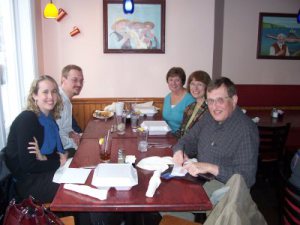 I heard the sad news this afternoon that on September 30, my friend Joe Smith had passed a way. After struggling for several months with lung cancer, loosing his voice and later his strength, he ended his fight last week. He left this earth too soon!
I heard the sad news this afternoon that on September 30, my friend Joe Smith had passed a way. After struggling for several months with lung cancer, loosing his voice and later his strength, he ended his fight last week. He left this earth too soon!
When Joe and I first met, I was one of the pastoral associates at First Baptist Church of Gaithersburg, Maryland. He entered the picture as Interim Pastor hired by the church leadership to come and "supervise" the "young pastoral staff" because we weren't seen as capable of leading the church in the transition. If you know me well at all, you know that such an intention of the church leadership was not agreeable to me-- I felt hurt and overlooked for the gifts I could bring to the church at this crucial time. So, especially in our first couple of interactions there was tension. Joe wondered why I wanted to preach so much as the previous Senior Pastor had allowed and seemed unsure of what to do with me . . and I wasn't sure what would happen. At best, I hoped that we could work together in ways that were helpful to the church. (Pictured to the right was the staff)
But as is the case in most relationships, when you move from knowing "of" someone to actually knowing them, things quickly change. As time went on and Joe heard me preach and I watched him lead, we soon gained respect for one another at a deep level, even with our theological differences. I knew he wanted me to succeed. He knew I would soon be a senior pastor, the question would just be where? I knew the church was blessed by his ministry. On countless occasions we would have long chats about how to best respond to moments of crisis within the congregation. Joe would carefully listen to my perspective and always made me feel like a valuable part of the team. I learned so much from him about how to lead when you aren't in charge, the importance of sermon series in shaping the life of the church and how to really love being a pastor.
When we had lunch one afternoon in Bethesda, three years ago now, I told Joe the news I dreaded to share. I would soon be leaving FBCG to become the pastor of Washington Plaza. He quickly put me at ease and cheered me on for this new adventure.
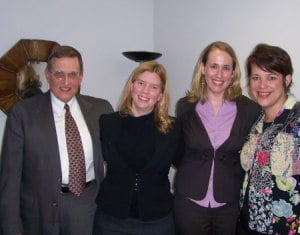 On my first Sunday at Washington Plaza in January of 2009, I found flowers on the altar that I knew he'd arranged to be present there in support of the day. And, when Washington Plaza installed me as their 4th pastor, Joe came again-- this time to give the "charge" to me to look to the future in ministry. He's pictured to the left alongside the two other speakers for the special occasion.
On my first Sunday at Washington Plaza in January of 2009, I found flowers on the altar that I knew he'd arranged to be present there in support of the day. And, when Washington Plaza installed me as their 4th pastor, Joe came again-- this time to give the "charge" to me to look to the future in ministry. He's pictured to the left alongside the two other speakers for the special occasion.
Over the past several years, we've kept in touch though we no longer worked together. I was given several wonderful volumes from his library that he was cleaning out and wanted to give to some "young pastors." (This time I didn't mind being called "young"). I found out that Joe was reading my blog and was eager to comment if something I wrote connected with him in any way. Joe was also quick to send me an email about news of shared friends. For he never wanted me to be out of the loop.
Joe was kind and thoughtful in ways that were attentive to detail but were never showy or over the top. He left a legacy of faithfulness in so many communities of well-edited documents, quick humor and preaching on his toes.
I will miss Joe and know some angels in heaven must be rejoicing about now as he is at peace. I am sorry, Joe, that I never got to say good-bye! I am forever grateful for your contributions to my life. With my deepest regards-- your last associate pastor trainee.
 Back to the Basics Series: The Community of Communion
Back to the Basics Series: The Community of Communion
Matthew 18:15-20
If there is anything that remains constant in the ever-changing world of publishing, it is that Americans will buy a book if they think it will help them be better at doing something. Though, maybe, you are like me and browse the “self-help” or “non-fiction” aisle at Barnes and Noble every now and then thinking to yourself now that’s not really rocket science, I could have written that! Men are from Mars and Women are from Venus seems to be a title any of us could have come up with! (Because we already knew this, right?)
Ultimately, we are a people who like finding a life script which tells us exactly what we are to do. Such is why books like The 17 Day Diet, The Wealth Cure, and The 4-Hour Body are currently on the New York Times Best Seller list. Achieving my financial goals, all while spending 17 days to achieve the body I want, spending only 4-hours a week doing it, sounds great to me, doesn’t it to you? Using one’s own brain and/or practical sense is highly over-rated, isn’t it? Just give me some answers in plain speech.
In the same way, when many faith seeking Christians read our text for this morning, which outlines a script, a plan if you will for how to deal with community relations when conflicts emerge, they jump up and down and say in delight, “Finally Jesus tells us exactly what to do! It’s the script we’ve been hoping for! So let's get to it!"
And the script goes something like this: when there’s a conflict between two members of a church—presumably because someone “sinned” or is at fault for making a mistake of judgment against another, it is the job of the person who has been “wronged” to go and point out the error of ways to the other.
First, this should be done privately. The hope is that the sinning person will listen to the person who is calling them out, and so all will be well.
But, second, if this doesn’t work out, then, the wronged person is to gather support with two or three other witnesses, so to go back and confront the sinner again. And, then if the person refuses to listen to this crowd, the entire church community should be notified of the wrong and if the offender refuses to confess their sin to even the church, it’s the ultimate insult.
Verse 17 writes, “Let such a one be to you as a Gentile and a tax collector.” I.e. you are simply screwed. As Jesus was speaking to an entirely Jewish audience, he compares the unrepentant sinner to the worst type of person that a member of the crowd could think of—thus saying to them, you don’t want to be that person, so make up quickly!
Seems simple enough, but what happens when this comes to play in actual practice?
Pastor Deanna Langle, a Lutheran clergy woman, tells the following story from her congregation of the staff and church leadership seeking to live out these verses of scripture:
One afternoon Rev. Langle, an associate pastor at a large multi-staff congregation, found herself with a crying administrative assistant in her office. She writes:
The woman in front of me was a woman of integrity, deep faith and sincere commitment to the church. She had been hired to be a pastoral assistant, and in that role she had contributed substantial time and amazing gifts to the congregation. She had asked for a meeting with me only after trying to speak with her supervisor, the administrative pastor.
So when she noticed a problem, in this case the pastor’s misuse of power, she confronted the situation and challenged him. The senior pastor tried to silence her and ignore her.
Reluctantly, she asked the executive council to hear her concern, but council members refused.
The pastor had told them that the discussion must remain between the two of them. He quoted Matthew 18 in support of this decision: "If another member of the church sins against you, go and point out the fault when the two of you are alone." By complying with the pastor and his use of a biblical directive, the council members allowed him to protect himself and them from the truth.”[i]
The pastor simply got a way with a huge error of judgment that would hurt the congregation in retrospect for generations—all because he used scripture to “justify” his actions.
Sounds twisted, but you and I know that stories like this are not isolated cases. I have experiences like this in earlier places of ministry, myself as well. For if there is anything that Matthew 18 has given the church a legacy of, it is not peace and reconciliation, but it is often one of abuse of power, domination of the strong over the weak, and Biblical literalism slammed in the faces of those who are seeking to do the right thing.
For if read literally, these verses seem to imply that if two or three people agree on anything, they have the right to be the bullies. But, if you’ve read any other stories of Jesus throughout the gospels, the concept of these verses seem to say the exact opposite of the message of Jesus we’ve all come to know. The message of “the last shall be first” “love your enemies and pray for those who persecute you” and all of the turning the world upside down questions that Jesus proposed. So where is Jesus in all of this?
If we turn back a few verses to the beginning of chapter 18, what we find that our lection for today actually comes in the context of Jesus having a few teaching moments with his disciples when they came to him and asked the question: “Who then, is the greatest in the kingdom of heaven?”
And, though I can imagine that Jesus wanted to knock the boys around a time or two saying to them, “Are you not listening? Have you not been listening this whole time? Why in the world would you ask a stupid question like that?”
Instead, of giving these fellas the quick snarky comment that they probably deserved, Jesus models the different approach to conflict that he was seeking to teach about. Throughout this chapter, Jesus opens up the conversation about how important it is to pay attention to those in whom we usually forget such as the children, those who are lost from home, those in whom we have conflict and those who drive us so crazy that we can’t imagine forgiving them yet one more time.
And, thus, without directly saying it, Jesus answered the “Who is the greatest the kingdom of God?” question by reminding them that there is another question altogether to be asking in the first place: “What is the kingdom of God?” Saying, life in the kingdom of God is all about an inclusive vision of the world where those who would seem to matter the least are not left out.
So, getting back to our particular lection for today, we discover that the over arching message Jesus is teaches goes back simply the COMMUNITY he hoped his disciples would create—a community that would be the foundation of their lives together as their faith was shared with the world. They would need to a pay attention to conflicts among them because it had EVERYTHING to do with how they lived out his mission on earth.
But, in our social networked everything world these days, community is a word that doesn’t strike our ears as that unusual. Dave Loose puts it like this, “Community, after all, is one of those feel good words that draw us into idealism—we imagine something out of Cheers, a place where everybody knows your name is glad you came. But the really difficult thing about community is that it is made up of people! And people—not you and me, of course, but most people—can be difficult, challenging, selfish, and unreliable. Which means that usually when we’re daydreaming about community we’re often prompted to do so because we don’t particularly like the people—i.e. the community!—we’re currently a part of.”
But, if we are going to take Jesus seriously here, and we know that how we treat one another when we don’t see things clearly really does matter, then you and I are going to have to think of community in more serious terms than the care free nature of the theme song from Cheers.
We’ve got to know that bitterness, unresolved pain, and gossip can kill any fellowship faster than the presence of a dead snuck can kill an outdoor party. And, protecting our fellowship, matters doesn’t it?
So, with this true, we have to pay attention to how we are getting along with one another in community realizing that as human beings a) no one is perfect (including your pastor)
b) communities are made up of these imperfect people
c) when problems arise and we’re involved, we are to do something about it, namely be a grown-up and go to the person with whom you have a conflict and work it out directly first, and
d) if that doesn’t work, seek wise counsel from within the community knowing that it is the community’s responsibility not to choose sides, appoint blame, but to care enough about all people to see the struggle through.
Because I’m sure I’m not telling you anything new when I say that as human beings, we will always face conflict because our nature is to act independently, write people off when they hurt our feelings, rather engage one another in the deep wells of community.
Yet, the question remains then, what will we do with the conflict when it comes? And, how will the church community be any different from the average mom’s club, running group, knitting circle, wine tasting gathering or investment circle—what makes a faith community so unique?
When I think about how a faith community, that Jesus was teaching about, distinguishes itself from all others, I believe a good way to understand it, all goes back to what it is we do here every month at this table. For it is in communion, you and I say something together about what type of community we are.
I want you to take out your bulletin this morning and look ahead in the service plan about what is upcoming in the service after the sermon. You’ll notice that the first thing we’ll do after being invited to the table is to pray a prayer of confession together. It’s an act we partake in as an expression of our faith in this being a meal that is not of us, but of God. And because it is of God, we must be mindful of God’s holiness—saying to the Lord that we have fallen short of all the good things prepared for us, and before we receive the bread and cup of Christ, we must consider our role in purifying our own minds, hearts and souls as individuals.
And, second, we will pass the peace of Christ to one another. While I know this is one of the most enjoyable parts of the service for many of you, like a good intermission break of musical chairs to greet your friends with hugs and handshakes of peace—its practice says so much more than meets the eye.
We greet one another in the peace of Christ as a remembrance that we are ALL a part of God’s body. We all matter to God and so we all are to matter to one another. And, so if we are out of fellowship with ANYONE that we worship alongside, we out of fellowship with God .
Coming to the table, you see is not an individual driven act, it’s not a place where we come to get blueprint of what to do next, or even a place where we can come thinking we are in this alone.
Rather, it’s a place where we define our community as one giant messy experience of faith in something larger than ourselves with our brothers and sisters in Christ as companions on the journey. So that we can’t ignore fussiness, gossip, bitterness or discord of any nature if we want to truly see God’s presence in our midst. We have to claim our work with one another in community building as a sacred, a very sacred act.
The type of community we are to create, according to Matthew’s gospel, you see, is not to be made up of some token inclusivity that means diversity guidelines, politeness, and political correctness—but rather a state of being where we take our cues from this supper: a supper of radical inclusivity. The supper where Jesus taught us who was the greatest, when he as the Son of God, sits among this followers and says, “This is my body broken for you.”
I know one of your favorite songs, like it is mine, is the one that exhorts us, “They’ll Know We Are Christians by our love.” Today, as we take this meal and live out the message of Jesus that all are welcome here and in this body, all people will know we are Christians by our love of how we treat one another. It’s as basic and complex as that!
Won’t you join me today at this meal of love and celebrate together in our worship the community of Christ from which our communion is shared?
AMEN
[i] Langle, Deanna. “A Careful Read (Matt. 18:15-20)” The Christian Century Online. http://www.religion-online.org/showarticle.asp?title=3263
The longer I am the pastor of my congregation, the more I am convinced that one of our growing edges comes in the category of diversity.
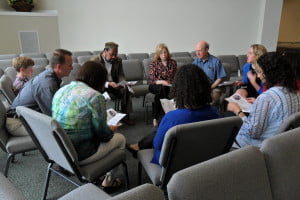 Diversity, a cultural buzz word these days often is what someone talks about when they find themselves in a homogenous group and know it needs some spicing up. It's a word we often use to describe our intentions, but rarely the reality. It's something that makes us feel good to talk about but scares us to death to live out.
Diversity, a cultural buzz word these days often is what someone talks about when they find themselves in a homogenous group and know it needs some spicing up. It's a word we often use to describe our intentions, but rarely the reality. It's something that makes us feel good to talk about but scares us to death to live out.
Yet, without mandate from an overseeing bishop (since Baptists don't have them), it's something that Washington Plaza has sought to be for over the years. We've regularly welcomed with ease members from other denominational backgrounds without asking for re-baptism. Many nationalities are represented in the membership rolls at all times. We have gay and straight members alike, no big deal. We have folks who are all sides of the theological spectrum on a number of given issues. And, we love the republican delegation of members as much as we do the democratic leaning folks.
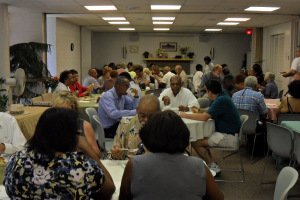 All of this is great and should be celebrated and is one of the reasons why I am proud to be Washington Plaza's pastor, but I wonder if diversity is something that we find merely in our community and our individual lives as a noun or has it transformed our lives as a verb?
All of this is great and should be celebrated and is one of the reasons why I am proud to be Washington Plaza's pastor, but I wonder if diversity is something that we find merely in our community and our individual lives as a noun or has it transformed our lives as a verb?
When I came back from my Interfaith trip to Israel in January, I became more convinced that if I said I was a pastor who cultivated diversity in my congregation and in my life, then there was going to have changes all around in my priorities. (I even wrote an article in Baptist Today about just this exhortation).
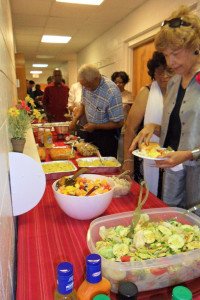 And, as I have begun to make changes, I've seen that diversity practice exists as an intentional lifestyle choice. And, it is a choice, I am challenging Washington Plaza folks to continue to make too.
And, as I have begun to make changes, I've seen that diversity practice exists as an intentional lifestyle choice. And, it is a choice, I am challenging Washington Plaza folks to continue to make too.
I've found that it's a choice that shows up in who I go to lunch with. It's a choice that has everything to do with who comes to dinner at my home and to whose homes I go. It's a choice that says everything about what books I read, how I prepare for sermons and most importantly how I lead.
In light of all of this, as a congregation, we've been busy building relationships that are more than token partnerships right in our own neighborhood. It's good to start where you are, right? We're seeking to make real friends with other congregations which are like us theologically but different from us racially. We're seeking to make friends with those who look like us but theologically see the world going in different directions than us. We are seeking to make friends with people that we have never interacted with before such our Muslim brothers and sisters.
In the past six months, we've hosted Martin Luther King Jr. Christian Church for a celebration of diversity special afternoon service and reception, we've shared in a community forum at Oakbrook Church about Israel and Palestine, we've hosted our friends again from MLK for a shared meal, we've served as the hosting congregation for the Reston Interfaith Ministrium bi-monthly gatherings and we've welcomed friends in our facility from Northern VA Hebrew Congregation and other faith communities for an Interfaith book club discussion. Most of these congregations are in a less than five-mile radius of where we are located-- proving you don't have to go far to find ways to live into your growth of diversity.
And, this is just the beginning as I see it. Why? Because diversity is a verb. To be diverse, it's an action that one must make their own, over and over again until it becomes so normal that it doesn't feel like an imposed concept but simply who we are as people.
I'm glad to be on this journey of neighborhood partnerships, seeing to be a witness of Christ's love in the Reston area. It's a work that has changed my life and I know will continue to do so for our church as the testimony of diversity as a verb lives on.
When you are a child, it is ordinary to say, "I want to be like ____ when I grow up."
We watch, we imitate, and we learn by being around folks who inspire us the most. It's the tools of how we figure out who we most want to be. Though usually our first ideas have something to do with being a fireman or a police officer or wonder woman. I always wanted to be a woman who delivers the mail, though you see how that turned out.
 On the first day of our sessions with Richard Lischer, he said the first steps to becoming a good writer are admiration and imitation. And for this reason, we were asked to bring to class a selection of a poem or story that was particularly moving to us and our writing style. Words like "all I wanted was to be born with a good set of lungs" or "it is like touching a dented cup" flowed around the room and we all considered the ways in which our writing could be as the prose of those we liked the best. The morning of these reading brewed over with delights of ear all around.
On the first day of our sessions with Richard Lischer, he said the first steps to becoming a good writer are admiration and imitation. And for this reason, we were asked to bring to class a selection of a poem or story that was particularly moving to us and our writing style. Words like "all I wanted was to be born with a good set of lungs" or "it is like touching a dented cup" flowed around the room and we all considered the ways in which our writing could be as the prose of those we liked the best. The morning of these reading brewed over with delights of ear all around.
In our everyday lives, we've all read a book or seen a performance or heard a speech when the person who is speaking sounds exactly like someone else we know. It's familiar, but maybe too familiar. So in the end, while useful as a learning tool, imitation, it doesn't provide our world with anything new. We don't see God in any fresh wind of the Spirit sort of ways.
There comes a time when art must come from within and rest upon individual voice. Who am I? Who are you? And how through what I say, can you tell us a part?
One of the themes that has run throughout several of my conversations, especially with the other female pastors at the Insitute this week has been of how much women struggle with voice.
In a culture when so much is expected of us: wife, mother, professional, writer, friend, you name it, we are much more likely among our male colleagues to shrink back when it comes to letting our voice shine through. We take associate positions when we really want to preach. We say "ok" to youth trips for back to back weeks, even if this means neglecting our children. We don't dare voice our ambition or dreams for fruitful work because we fear it might hurt someone's feelings. I could be oversimplifying, I realize, but there's something to this voice thing that we should pay attention to.
I speculate this problem occurs because we don't want to come across as the "over powering" or "bitchy" females. We are so thankful to be where we are, that we dare not ask for more. Or, simply we just don't know what our voice is because we're afraid of what we might have to do with it, if it was finally heard. And, as the church, we are left without voices, lots of voices that we need to hear the most.
But this week, I've been learning that my writing (and my preaching for that matter) will not soar to the heavens as it could, if I don't continually keep finding and hanging onto what makes me uniquely me. If I don't recognize my voice and use it, God doesn't have even a first draft to work with.
So, what's holding you back? Speak! Write! Be!
When I grow up, I want to be a writer. How about you?
 When I began the journey into the strange world called being a Baptist female pastor, I knew there would be challenges. I knew there would be folks who would throw the Bible at me wondering if I believed in the same gospel as them. I knew I would have trouble finding positions to serve that my male colleagues would obtain with ease. But, what I didn't know is that some of my toughest critics would be my sisters, those who had come before me or joined the ranks of being a woman in ministry.
When I began the journey into the strange world called being a Baptist female pastor, I knew there would be challenges. I knew there would be folks who would throw the Bible at me wondering if I believed in the same gospel as them. I knew I would have trouble finding positions to serve that my male colleagues would obtain with ease. But, what I didn't know is that some of my toughest critics would be my sisters, those who had come before me or joined the ranks of being a woman in ministry.
I once worked with a female supervisor who made a very big deal about wearing closed toe shoes in the pulpit. No exceptions during the time I worked under her. What was the big deal about open toed shoes-- too sexy? I laugh about it with this colleague now and wear open toed shoes in the pulpit regularly. And, I've never heard complainants about my shoes being a distraction . . .
I have a colleague my age who was told once by an older female supervisor that she had to always wear pantyhose to church-- even if she wore pants and even in the summer. Why? Don't dare show one's skin as a female? I have been known not to wear hose to church in the summer especially as I regularly preach in a robe over my clothes anyway. No one can see my legs after all, so who cares?
I supervised a female seminarian once who had just finished her initial preaching class the semester before with a female professor at a Baptist seminary. When I asked her some of the most memorable things she learned, she was quick to say:"We spent a whole session without the men in the room with the professor describing what kind of bra we should wear when we preach." What??? There are no words for this.
The more I've learned about the "backstories" to these encounters of mentoring, the more I've also heard that the older women who teach such things usually don't exactly know why they believe so strongly in these practices. It is just what they do. It was another woman who put the fear of God in them about shoes, hose and bras for preaching that they felt the necessity to put that same fear into their younger colleagues.
To all of this, I say it must stop.
To be a woman in ministry is not to become less of a female or to try to achieve some level of perfection so that we reflect well on our older mentors as one blog post yesterday seemed to suggest.
We, as women need to stop being the worst critics of one another.
Sure, appropriate dress, appropriate speech, appropriate presentation of our appearance are important professional development learnings, but my sisters, let us not take out the struggle of how hard it has been to get where we are on each other. There are some expectations that go beyond the realm of what it means to be human.
My sisters, practice kindness wear fun shoes while you do it.
"I love you."
It takes a relationship to a deeper level like no other three words can. Where were we when we first said the "L word?" Often couples remember this moment in their dating time together more than any other. Who said it first? How often did you want to say it afterward-- screaming to the world, "He loves me!" and "She loves me too!" Time is marked with particular delightfulness.
Recently, I was chatting with a friend, when out of the blue the conversation was ended with a hug and the simple statement of "I love you." Nothing was meant by this phrase, other than the simple wish of how much our friendship meant to him. I was taken back and warmed in spirit all at the same time.
No matter who it comes from, there is something often shock ing about these words, especially when we hear them for the first time.
ing about these words, especially when we hear them for the first time.
But, what if such a word is not said often. What if such a word has not been said in years? What if great damage has been done in the name of the "L word?" What is unconditional devotion has been promised and pain has been inflicted in its place?
Where does this leave the hopeful beauty of these words?
One of the ministries of my congregation is a card ministry: telling visitors, new members and older members alike that they are thought of when they are going through a difficult time, experience a period of joy or loss. Though I know there is not anything unusual about this (lots of churches regularly send care, concern and celebration cards to their members), the more I have observed this ministry in action, the more I've realized there is something deeply rooted in the character of our congregation through these cards. And, it's love.
The first time Kevin and I got one of these cards, I was first shocked that I got something from the church that I didn't send myself. Then, as I read the note, I was overwhelmed by the fact that every single person who signed it included the word, "Love" before their name. The genuine nature of their spirit leapt off the page. Furthermore, I was not getting special treatment because I was the pastor. This is what they did for everybody! It was such a natural practice to say to their church family: "I love you."
What might it look like if our churches used these three words more often? What if the basis of our relationships with one another began with this? What if we not only loved each other through cards, but through actions and appropriate expressions of love such as hugs more often than every couple of years?
With all of the damage that has been done by persons in positions of power using "I love you" to manipulate, control and orchestrate inappropriate relationships within the church, I fear we as people of faith have lost the beauty of these words to bringing healing, comfort and joy to those in whom we are in community with. For as much as our society has commercialized romantic love, it's not the only love to be found in our lives. I can say that if all I had in my life was the love from my significant other, I know my life would not be as rich as it is right now because I'm a part of communities full of love for one another.
Who might we need to take the leap of vulnerability with today and say simply, "I love you?" Where in our lives do we need to be more open to receive the outpouring of the blessings of love from others? How might giving and receiving love begin to transform our communities into more faithful, God centered places?
Go ahead. Just say it. "I love you."